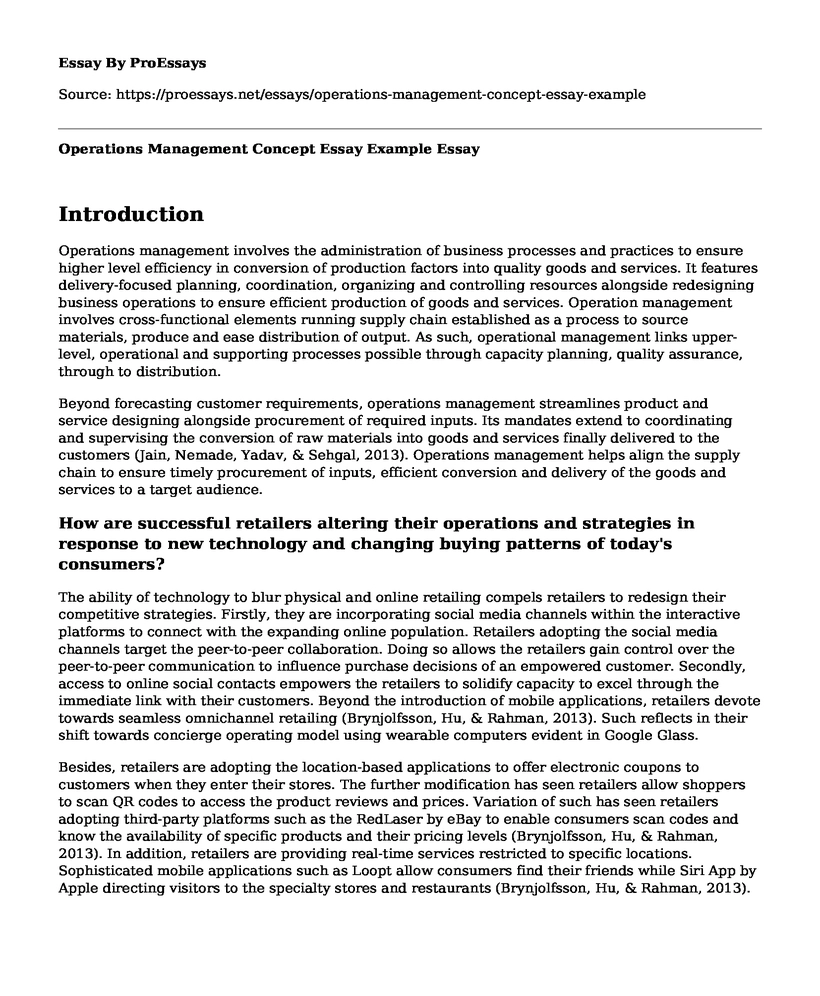Introduction
Operations management involves the administration of business processes and practices to ensure higher level efficiency in conversion of production factors into quality goods and services. It features delivery-focused planning, coordination, organizing and controlling resources alongside redesigning business operations to ensure efficient production of goods and services. Operation management involves cross-functional elements running supply chain established as a process to source materials, produce and ease distribution of output. As such, operational management links upper-level, operational and supporting processes possible through capacity planning, quality assurance, through to distribution.
Beyond forecasting customer requirements, operations management streamlines product and service designing alongside procurement of required inputs. Its mandates extend to coordinating and supervising the conversion of raw materials into goods and services finally delivered to the customers (Jain, Nemade, Yadav, & Sehgal, 2013). Operations management helps align the supply chain to ensure timely procurement of inputs, efficient conversion and delivery of the goods and services to a target audience.
How are successful retailers altering their operations and strategies in response to new technology and changing buying patterns of today's consumers?
The ability of technology to blur physical and online retailing compels retailers to redesign their competitive strategies. Firstly, they are incorporating social media channels within the interactive platforms to connect with the expanding online population. Retailers adopting the social media channels target the peer-to-peer collaboration. Doing so allows the retailers gain control over the peer-to-peer communication to influence purchase decisions of an empowered customer. Secondly, access to online social contacts empowers the retailers to solidify capacity to excel through the immediate link with their customers. Beyond the introduction of mobile applications, retailers devote towards seamless omnichannel retailing (Brynjolfsson, Hu, & Rahman, 2013). Such reflects in their shift towards concierge operating model using wearable computers evident in Google Glass.
Besides, retailers are adopting the location-based applications to offer electronic coupons to customers when they enter their stores. The further modification has seen retailers allow shoppers to scan QR codes to access the product reviews and prices. Variation of such has seen retailers adopting third-party platforms such as the RedLaser by eBay to enable consumers scan codes and know the availability of specific products and their pricing levels (Brynjolfsson, Hu, & Rahman, 2013). In addition, retailers are providing real-time services restricted to specific locations. Sophisticated mobile applications such as Loopt allow consumers find their friends while Siri App by Apple directing visitors to the specialty stores and restaurants (Brynjolfsson, Hu, & Rahman, 2013).
References
Brynjolfsson, E., Hu, Y. J., & Rahman, M. S. (2013). Competing in the Age of Omnichannel Retailing. MIT Sloan Management Review, 54(4).
Jain, R. K., Nemade, H., Yadav, G. H., & Sehgal, P. (2013, May). Operations Management in Different Disciplines. International Journal of Advances in Engineering & Technology, 6(2), 938-944.
Cite this page
Operations Management Concept Essay Example. (2022, May 26). Retrieved from https://proessays.net/essays/operations-management-concept-essay-example
If you are the original author of this essay and no longer wish to have it published on the ProEssays website, please click below to request its removal:
- Case Review Example: 23andMe Genetic Testing for Consumers
- SWOT Analysis and Strategic Planning Paper Example
- Essay Sample on Plan to Hire the Right People
- Intellectual Leadership: Driving Innovation in Higher Education - Essay Sample
- Essay Example on Liquidation Damages: A Remedy for Breach of Contract
- SAP Org: Investigating Change Mgmt. Models & Staff Perceptions - Essay Sample
- Essay Example on Kitchen Essential Products Inc.: Ensuring Safety & Quality Through Duty Of Care







